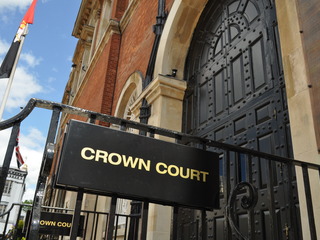Thames Water was fined £380,000 at Aylesbury Crown Court on Monday 7 March 2016 for polluting more than 2.7km of the Horsenden Stream in Buckinghamshire.
The case was brought by the Environment Agency after Thames Water caused pollution from their site at Princes Risborough STW (Sewage Treatment Works) to enter Horsenden Stream – part of the River Thame catchment area in the Chilterns, which is an Area of Outstanding Natural Beauty.
The company was also ordered to pay costs of £23,092.64 and a victim surcharge of £120 after pleading guilty at Wycombe Magistrates Court on 5 August 2015.
The ongoing management failures at a site the court described as clapped out were lamentable and caused the company to breach the site permit on a number of occasions between February and July 2013.
The court heard how in February 2013 an officer conducting an unrelated fisheries survey of the stream had to stop for his own welfare because of the level of sewage in the stream.

The Recorder of Aylesbury, His Honour Judge Sheridan, noted that if it wasn’t for the fisheries survey the incidents were unlikely to have come to light due to the unacceptable level of management failures at the site.
A further discharge was seen by officers during a site visit on 5 March 2013 when the sewage in the stream looked like feathers in places, and again on 19 July 2013, the latter being caused by a blockage in the works.
Princess Risborough STW is operated by Thames Water.
Sewage requires treatment before it can be discharged into a receiving watercourse because it includes human waste, a variety of poIlutants, organic materials and chemicals.
The conditions of the environmental permit set by the Environment Agency aim to prevent pollution of the stream. The permit also allows Thames Water to discharge sewage during storm conditions as long as stringent conditions are met.
Between February and July 2013 the site was poorly managed and there were ongoing problems. Storm discharges into the stream were either observed or recorded in the log book on 21 occasions.
The inlet screens, designed to prevent debris from entering the works and causing blockages, were not working and the storm tank pump was broken.
The site’s storm weir was also set too low which meant that discharges were happening when the effluent should have been passing through the works for treatment.
Environment Officer, Holly Linham said:
“Our officers attended the site where they walked the Horsenden Stream and saw thick layers of sewage fungus carpeting the river bed and plants.
“One of the officers had never seen sewage fungus in a stream that bad before.
“A biological survey of the stream noted that the impact of the sewage was chronic and was likely to have been prevalent for some time”.
“The conditions observed by Environment Agency officers during their visits were not isolated incidents. Log book entries suggest ongoing discharges and other problems at a site that was struggling to cope”.
“We take these types of incidents very seriously and will do everything within our powers to safeguard the environment and people that maybe affected, and that includes holding those who put the environment at risk to account for their actions”.
In sentencing the court gave Thames Water full credit for its early plea.
The company has since changed the management structure at the site and raised the storm weir. As a result the stream has improved.
The court placed on record the company’s commitment to improving its environmental performance and noted that it could face significantly higher fines in future if it did not stay true to its word.










